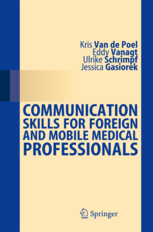Communication tips by Nursing on the Move.
 Are you a medical professional who uses a foreign language at work?
Are you a medical professional who uses a foreign language at work?
Do you have a friend who speaks a foreign language at work or has a cultural background different from colleagues/customers?
Honest language is above all truthful. Medical professionals always have to be honest with their patients, even when this is difficult. This includes being truthful about the seriousness of their diagnosis, their options for treatment and their prognosis. This is closely related to both understandable and respectful language. Generally, honest language is also clear (not vague or ambiguous) and descriptive (non-judgemental).
Different cultures may have different perspectives towards honesty.
- In some cultures, it may be considered appropriate to comfort patients by telling them positive things, even if they are not (completely) true.
- In most Western countries, it is considered important to be completely honest with the patients about their state and prognosis. It is not considered appropriate to say: ‘I am sure it’s going to be fine’ to a patient who is terminally ill“
For more information, tips and examples, click here.
Oxford Medical and ISC Medical also offer communication courses for medical professionals.

© 2019 Communication for Professionals
Communication Skills for Foreign and Mobile Medical Professionals
van de Poel, K., Vanagt, E., Schrimpf, U., Gasiorek, J.
Around the world, the number of internationally mobile medical professionals is steadily increasing, posing potential difficulties for the good communication with patients and colleagues that is vital to satisfactory outcomes and personal professional success. Communication Skills for Foreign and Mobile Medical Professionals is an evidence-based communication resource book designed for all medical professionals who work in foreign countries, cultures, and languages. It offers a wealth of insights into doctor-patient communication, structured around the different phases of the consultation… shop the book
Physician Attire in the Intensive Care Unit and Patient Family Perceptions of Physician Professional Characteristics
by Selena Au, MD; Farah Khandwala, MSc; Henry T. Stelfox, MD, PhD
Physician attire is a modifiable factor that has been demonstrated to influence the patient-physician relationship. However, patient-physician interactions in the intensive care unit (ICU) differ from other health care settings. Patients admitted to the ICU typically do not have a preexisting long-term relationship with their ICU physician, and therefore trust needs to be established over a short time frame. The severity of patient illness frequently results in the active participation of family as surrogate decision makers, complicating the patient-physician relationship… read this article
Read also the article:
Published in GI-Mail 03/2017 and 06/2019 (English & German edition). Sign up for GI-Mail here. 
Tip: More up to date educational events can be found online in the Education Database »medicine & health«.
